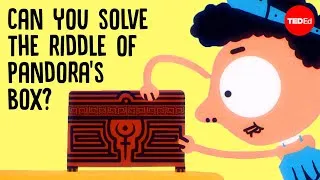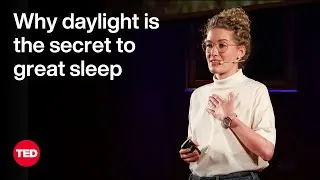When do kids start to care about other people's opinions? | Sara Valencia Botto
152,830 views ・ 2019-09-13
請雙擊下方英文字幕播放視頻。
譯者: Yixuan Chen
審譯者: Thomas Tam
00:12
I'd like you to take a moment
0
12262
1450
我想請你花一點時間
00:13
and consider what
you are wearing right now.
1
13736
3000
想想你現在所穿的是什麼
00:17
I have a deep, philosophical
question for you.
2
17675
2872
我有一個深刻的哲學問題想問你
為什麼我們現在
都沒有穿著舒服的睡衣?
00:21
Why are we not all wearing
comfortable pajamas right now?
3
21079
2682
00:23
(Laughter)
4
23785
1000
(笑)
00:24
Well, I'm a psychologist
and not a mind reader,
5
24809
2538
我是個心理學家
可不是個會讀心術的人
00:27
although many people think
that's the same thing.
6
27371
2372
雖然很多人都覺得那是同一回事
00:30
I can bet you that your response
is somewhere along the lines of,
7
30069
3667
我打賭你的回答
會是接下來的這句話:
00:33
"I'm expected to not wear pj's in public"
8
33760
2674
「我可不想在公共場合穿睡衣」
00:36
or "I don't want people
to think I am a slob."
9
36458
2548
或者:「我不想
讓別人認爲我是個懶人」
00:39
Either way, the fact that we all
chose to wear business casual clothing,
10
39665
4051
無論你的答案是什麽,事實上
我們全部都選擇穿著半正式服飾
00:43
as opposed to our favorite
pair of sweatpants,
11
43740
2151
而不是我們最喜歡的一條運動褲
00:45
is not a silly coincidence.
12
45915
1800
並不是個傻乎乎的巧合
00:48
Instead, it reveals two
defining human characteristics.
13
48311
3897
相反,它揭示了兩個人類特徵
00:52
The first is that we are cognizant
of what other people value,
14
52704
3595
首先我們瞭解到別人的價值觀是什麽
00:56
like what they will approve
or disapprove of,
15
56323
2627
就像他們會贊成或不贊成某件事
00:58
such as not wearing pj's
to these sorts of settings.
16
58974
3016
比如在某些場合不穿睡衣
01:02
And two, we've readily used
this information to guide our behavior.
17
62490
3714
第二,我們很容易以這樣的信息
指導我們的行為
01:07
Unlike many other species,
18
67149
1699
與其他任何種類不同
01:08
humans are prone to tailor their behavior
in the presence of others
19
68872
4040
人類很容易在別人面前
調整自己的行爲
01:12
to garner approval.
20
72936
1379
以獲得別人的讚許
01:14
We spend valuable time putting on make up,
21
74766
2318
我們花費寶貴的時間化妝
01:17
choosing the right picture
and Instagram filter,
22
77108
2904
選擇正確的圖片和 IG 濾鏡
01:20
and composing ideas
that will undoubtedly change the world
23
80036
2762
並且寫下那些無疑會改變世界的想法
01:22
in 140 characters or less.
24
82822
1733
但是得在 140 字以内
01:25
Clearly, our concern
with how other people will evaluate us
25
85561
3024
顯而易見的是
關心別人怎樣評價我們
01:28
is a big part of being human.
26
88609
1933
是人類的重要組成部分
01:31
Despite this being
a big human trait, however,
27
91530
2690
儘管這是人類的一大特點
我們卻相對較少瞭解
我們什麼時候開始
01:34
we know relatively little
about when and how
28
94244
2770
以及為什麼會關心別人的想法
01:37
we come to care
about the opinion of others.
29
97038
2230
01:39
Now, this is a big question
that requires many studies.
30
99649
3200
這是一個需要許多研究的龐大議題
01:43
But the first step
to uncovering this question
31
103269
2301
但是解開這個問題的第一步
01:45
is to investigate when in development
32
105594
2175
是在逐漸成長的過程中調查
01:47
we become sensitive
to others' evaluations.
33
107793
2717
我們是從什麽時候
對別人的評價開始敏感
01:51
I have spent the past four years
at Emory University
34
111245
2880
我花了過去的四年時間在埃默里大學
01:54
investigating how an infant,
35
114149
2087
研究原本可以在雜貨店內大大方方地
穿著連身衣亂跑的嬰兒
01:56
who has no problem walking
around the grocery store in her onesie,
36
116260
4286
02:00
develops into an adult
that fears public speaking
37
120570
2851
怎樣成長為一個因懼怕被負面評價
而害怕在公共場合説話的成年人
02:03
for fear of being negatively judged.
38
123445
2101
02:06
(Laughter)
39
126472
1637
(笑)
02:08
Now, this is usually a point
when people ask me,
40
128133
2341
這通常是人們會問我的問題:
02:10
"How do you investigate
this question, exactly?
41
130498
2579
「你到底是怎樣調查這個問題?
02:13
Infants can't talk, right?"
42
133101
1800
嬰兒不會説話,對吧?」
02:15
Well, if my husband
were up here right now,
43
135530
2150
好吧, 如果我丈夫現在出現在這裏
02:17
he would tell you that I interview babies,
44
137704
2667
他會告訴你我真的是訪問寶寶
02:20
because he would rather not say
that his wife experiments on children.
45
140395
4432
因為他不會想說
他的妻子用孩子做實驗
02:24
(Laughter)
46
144851
2552
(笑)
02:27
In reality, I design
experiments for children,
47
147427
3231
其實, 我給孩子們設計的實驗
02:30
usually in the form of games.
48
150682
1934
通常是以遊戲的形式實行的
02:33
Developmental psychologist
Dr. Philippe Rochat and I
49
153269
2745
發展心理學家菲利普·羅莎博士與我
02:36
designed a "game" called "The Robot Task"
50
156038
3111
設計了一個叫做
「機器人的任務」的「遊戲」
02:39
to explore when children
would begin to be sensitive
51
159173
2643
用來探索什麽時候孩子們會開始
02:41
to the evaluation of others.
52
161840
1867
對別人的評價變得敏感
02:44
Specifically, the robot task
captures when children, like adults,
53
164442
4492
具體來説,機器人的任務
能夠捕捉到孩子像成人一樣
02:48
strategically modify their behavior
when others are watching.
54
168958
3135
當別人在注視他們時
戰略性地改變他們的行爲
做實驗時,我們向
14 至 24 個月大的嬰兒展示
02:53
To do this, we showed
14 to 24-month-old infants
55
173030
3214
02:56
how to activate a toy robot,
56
176268
2175
怎樣啟動一個玩具機器人
02:58
and importantly, we either
assigned a positive value,
57
178467
2483
並且更重要的是
我們要麼給一個正面的價值觀
03:00
saying "Wow, isn't that great!"
58
180974
2246
說:「哇,這個真棒」
03:03
or a negative value, saying,
"Oh, oh. Oops, oh no,"
59
183244
2674
要麼給出個負面的價值觀說:
「 哦,糟糕,哦不」
03:05
after pressing the remote.
60
185942
1734
在按下遙控器後說
03:08
Following this toy demonstration,
61
188220
1577
在這個玩具示範之後
03:09
we invited the infants
to play with the remote,
62
189821
2548
我們邀請嬰兒們玩遙控器
03:12
and then either watched them
63
192393
1422
然後要麼注視著他們
03:13
or turned around and pretended
to read a magazine.
64
193839
2817
要麼轉過頭去假裝讀雜誌
這個設想是如果在 24 個月大時
03:17
The idea was that if by 24 months,
65
197212
2429
03:19
children are indeed sensitive
to the evaluation of others,
66
199665
3277
幼兒確實對他人的評價敏感的話
03:22
then their button-pressing behavior
should be influenced
67
202966
2675
那麼他們按遙控器的行爲
應該會被影響
03:25
not only by whether or not
they're being watched
68
205665
2381
不僅因他們是否被注視而影響
03:28
but also by the values
that the experimenter expressed
69
208070
2690
而且還因當他們按下遙控器時
實驗員表達出的評價所影響
03:30
towards pressing the remote.
70
210784
1625
03:33
So for example,
71
213173
1206
舉個例子
03:34
we would expect children to play with
the positive remote significantly more
72
214403
3628
我們會看到孩子在被觀察時
明顯的多玩正面的遙控
03:38
if they were being observed
73
218055
1365
03:39
but then choose to explore
the negative remote
74
219444
2143
但是當沒人注意他們時
他們會選擇玩負面的遙控
03:41
once no one was watching.
75
221611
1667
03:43
To really capture this phenomenon,
we did three variations of the study.
76
223952
3460
為了真正捕捉到這個現象
我們做了三個不同版本的研究
03:47
Study one explored how infants
would engage with a novel toy
77
227871
3349
第一個研究探討嬰兒如何在
沒有給出任何價值觀和指令時
使用一個新玩具
03:51
if there were no values
or instructions provided.
78
231244
2603
03:53
So we simply showed infants
how to activate the toy robot,
79
233871
2730
所以我們簡單向嬰兒
展示怎樣啟動玩具機器人
03:56
but didn't assign any values,
80
236625
1587
但是沒有給出任何的評價
03:58
and we also didn't tell them
that they could play with the remote,
81
238236
3111
並且我們沒有告訴他們可以玩遙控器
這給他們提供了一個非常模糊的情況
04:01
providing them with a really
ambiguous situation.
82
241371
2563
04:03
In study two,
83
243958
1183
在第二個研究中
04:05
we incorporated the two values,
a positive and a negative.
84
245165
4595
我們將兩個價值觀結合起來
一個正面的,和一個負面的
04:10
And in the last study,
we had two experimenters and one remote.
85
250609
3269
在最後一個研究中
我們設置了兩個實驗員和一個遙控器
04:14
One experimenter expressed a negative
value towards pressing the remote,
86
254196
3429
一個實驗員對按遙控器的行爲
給出負面的價值觀
04:17
saying, "Yuck, the toy moved,"
87
257649
1507
說:「糟糕,玩具動了」
04:19
while the other experimenter
expressed a positive value, saying,
88
259180
3017
而另一個實驗員
給出正面價值觀時說:
「吔,玩具動了」
04:22
"Yay, the toy moved."
89
262221
1400
04:23
And this is how the children reacted
to these three different scenarios.
90
263927
3531
這就是孩子們
對三種不同場景的反應
04:27
So in study one, the ambiguous situation,
91
267482
2840
那麽在第一個研究中
在這個模糊不清的處境裏
04:30
I'm currently watching the child.
92
270346
2411
我正在看著這個孩子
04:32
She doesn't seem to be too interested
in pressing the remote.
93
272781
2999
她看起來對按遙控器不太感興趣
04:36
Once I turned around --
94
276622
1669
一旦我轉過頭去
現在她已經準備好按遙控器了
04:39
now she's ready to play.
95
279061
1611
04:40
(Laughter)
96
280696
1150
(笑)
04:43
Currently, I'm not watching the child.
97
283903
1910
現在,我沒有注視孩子
04:45
She's really focused.
98
285837
1151
她真的很專注
04:47
I turn around.
99
287012
1150
我轉過來了
04:49
(Laughter)
100
289588
1032
(笑)
04:50
She wasn't doing anything, right?
101
290644
2200
她什麼也沒做了,對吧?
04:55
In study two, it's the two remotes,
102
295596
1751
在研究二中,是兩個遙控器的
04:57
one with the positive
and one with the negative value.
103
297371
2547
一個是正面的,另一個是負面的
04:59
I'm currently observing the child.
104
299942
1667
我現在正在觀察這個孩子
05:01
And the orange remote
is a negative remote.
105
301633
2506
橘色的遙控器是個負面遙控器
05:05
She's just looking around,
looking at me, hanging out.
106
305259
2793
她僅僅是環顧四周,看看我,
05:08
Then I turn around ...
107
308494
1267
然後我轉過頭
05:12
(Laughter)
108
312081
1150
(笑)
05:15
That's what she's going for.
109
315072
1867
這就是她的目標
05:19
I'm not watching the child.
110
319875
1537
我沒有在看著孩子
05:21
He wants the mom to play with it, right?
111
321436
2244
他想讓媽媽陪他一起玩玩具,是吧?
05:23
Take a safer route.
112
323704
1267
真是很安全的一步棋
05:25
I turn around ...
113
325736
1150
我回頭
05:28
(Laughter)
114
328093
1667
(笑)
05:29
He wasn't doing anything, either.
115
329784
2200
他也什麼都不做了
05:36
Yeah, he feels awkward.
116
336371
1532
是啊,他覺得好尷尬
05:37
(Laughter)
117
337927
1007
(笑)
05:38
Everyone knows
that side-eyed glance, right?
118
338958
2119
大家都看到那側眼一瞥了,是吧?
05:41
Study three, the two
experimenters, one remote.
119
341807
2461
研究三,是兩個實驗員和一個遙控器
05:44
The experimenter that reacted negatively
towards pressing the remote
120
344292
3261
對按遙控器表現出負面態度的
實驗員看著孩子時
05:47
is watching the child right now.
121
347577
1627
05:49
She feels a little awkward,
doesn't know what to do, relying on Mom.
122
349228
4174
她看起來有一小點尷尬
靠在媽媽身上不知道該做什麽
05:56
And then, she's going to turn around
123
356307
2421
然後,實驗員轉過頭去
05:58
so that the experimenter that expressed
a positive response is watching.
124
358752
3467
所以只有表現正面回應的
實驗員在注視著孩子
06:04
Coast is clear -- now she's ready to play.
125
364109
2230
危險已經過去了,她開始行動了
06:06
(Laughter)
126
366363
1063
(笑)
06:07
So, as the data suggests,
127
367450
1905
因此,正如數據所示
06:09
we found that children's
button-pressing behavior
128
369379
2333
我們發現兒童按遙控器的行爲
06:11
was indeed influenced by the values
and the instructions of the experimenter.
129
371736
4809
確實是被實驗員的
價值觀與指令所影響
06:16
Because in study one,
children did not know
130
376934
2541
因為在研究一裡,孩子們不知道
06:19
what would be positively
or negatively evaluated,
131
379499
2888
什麼是肯定的或否定的評價
06:22
they tended to take the safest route
132
382411
1944
他們傾向於採取最安全的路徑
06:24
and wait until I turned my back
to press the remote.
133
384379
2680
並且等到我轉過頭去才按下遙控器
06:27
Children in study two
134
387083
1388
在第二個研究中的孩子們
06:28
chose to press the positive remote
significantly more when I was watching,
135
388495
3802
當我注意的時候,他們選擇按下
正面遙控器的次數明顯更多
06:32
but then once I turned my back,
136
392321
1571
但是只要我一轉過身
06:33
they immediately took the negative remote
and started playing with it.
137
393916
3423
他們便立即拿起並開始玩
負面的遙控器
06:37
Importantly, in a control study,
138
397363
1590
重要的是,在對照研究中
06:38
where we removed
the different values of the remotes --
139
398977
2941
我們刪除了遙控器的不同價值
06:41
so we simply said, "Oh, wow"
after pressing either of the remotes --
140
401942
3238
所以我們只是在按下
任意一個遙控器後說:「哦,哇」
06:45
children's button-pressing behavior
no longer differed across conditions,
141
405204
3451
孩子們的按壓行為不再因條件而不同
06:48
suggesting that it was really
the values that we gave the two remotes
142
408679
3731
表明我們給這兩個遙控器的評價
06:52
that drove the behavior
in the previous study.
143
412434
2730
的確推動了之前研究中的行為
06:55
Last but not least,
144
415188
1168
最後但跟之前同樣重要的是
06:56
children in study three chose to press
a remote significantly more
145
416380
3800
在第三個研究中
在表示正面的實驗員注視時
07:00
when the experimenter that expressed
a positive value was watching,
146
420204
3310
孩子們選擇按下
遙控器的次數明顯更多
07:03
as opposed to the experimenter
that had expressed a negative value.
147
423538
3267
而在負面價值觀的實驗員
注視時表現則相反
07:07
Not coincidentally,
148
427553
1278
這並非巧合
07:08
it is also around this age
that children begin to show embarrassment
149
428855
3643
大概就在這個年齡上下
兒童在可能引起負面評價的情況下
開始表現出困窘
07:12
in situations that might elicit
a negative evaluation,
150
432522
2993
07:15
such as looking
at themselves in the mirror
151
435539
2007
比如在看鏡子裡的自己時
07:17
and noticing a mark on their nose.
152
437570
1651
發現他們鼻子上有個印記
07:19
The equivalent of finding spinach
in your teeth, for adults.
153
439245
2810
對成年人來説相當於
看到卡在牙齒裡的菠菜葉
07:22
(Laughter)
154
442079
1174
(笑)
07:23
So what can we say,
based on these findings?
155
443277
3048
那麼基於這些發現
我們可以得出什麽結論呢?
07:26
Besides the fact that babies
are actually really, really sneaky.
156
446349
3452
除了嬰兒們其實都很狡猾這一事實
07:29
(Laughter)
157
449825
1056
(笑)
07:30
From very early on, children, like adults,
158
450905
3293
從很早開始,兒童就像成年人一樣
07:34
are sensitive to the values
that we place on objects and behaviors.
159
454222
3727
對我們放置在目標
與行為上的價值很敏感
07:38
And importantly, they use these values
to guide their behavior.
160
458354
3277
重要的是, 他們用這些價值觀
來指導他們的行為
07:42
Whether we're aware of it or not,
161
462425
1707
無論我們是否意識到
07:44
we're constantly communicating values
to those around us.
162
464156
3010
我們總是在不斷地
向身邊的人傳達價值觀
07:47
Now, I don't mean values like
"be kind" or "don't steal,"
163
467522
3484
現在,我不是在講像「行善」
或「不偷盜」這樣的價值觀
07:51
although those are certainly values.
164
471030
2111
雖然這些無疑都是價值觀
07:53
I mean that we are constantly
showing others, specifically our children,
165
473450
3603
我想說的是,我們常常向他人
特別是我們的孩子
07:57
what is likeable, valuable
and praiseworthy, and what is not.
166
477077
3682
展示什麼是討人喜歡的、有價值的
和可貴的,以及什麼不是
08:01
And a lot of the times,
167
481307
1176
並且很多時候
08:02
we actually do this
without even noticing it.
168
482507
2436
實際上我們甚至
沒有注意到我們這樣做
08:05
Psychologists study behavior
to explore the contents of the mind,
169
485601
3848
心理學家研究行為來探索内心
08:09
because our behavior
often reflects our beliefs,
170
489473
2930
因為我們的行為經常反應我們的信念
08:12
our values and our desires.
171
492427
2385
我們的價值觀和我們的願望
08:15
Here in Atlanta,
we all believe the same thing.
172
495471
2658
在亞特蘭大,我們都相信同樣的事情
08:18
That Coke is better than Pepsi.
173
498963
1738
可口可樂比百事可樂好
08:20
(Applause)
174
500725
1794
(鼓掌)
08:22
Now, this might have to do with the fact
that Coke was invented in Atlanta.
175
502543
4740
這可能與可口可樂
是在亞特蘭大發明的事實有關
08:27
But regardless,
176
507307
1174
但無論如何
08:28
this belief is expressed in the fact
that most people will chose to drink Coke.
177
508505
4287
這種信念表達的事實是
大多數人會選擇喝可口可樂
08:33
In the same way,
178
513323
1372
以同樣的方式
08:34
we are communicating a value
179
514719
1868
我們正在傳達價值觀
08:36
when we mostly complement girls
180
516611
1523
在多數情況我們讚美女孩時
08:38
for their pretty hair
or their pretty dress,
181
518158
2506
會讚美她們漂亮的髮型
或漂亮的裙子
08:40
but boys, for their intelligence.
182
520688
2389
但是讚美男生時
會稱讚他們的聰明才智
08:43
Or when we chose to offer candy,
as opposed to nutritious food,
183
523101
3743
或者當我們選擇給糖而不是營養品
08:46
as a reward for good behavior.
184
526868
2030
作為表現很好時的獎勵
08:49
Adults and children
are incredibly effective
185
529466
2742
成人與兒童能非常有效的
08:52
at picking up values
from these subtle behaviors.
186
532232
2495
從這些微妙的行為中獲取價值
08:55
And in turn, this ends up
shaping their own behavior.
187
535061
3505
而到頭來,這最終會塑造自己的行為
08:59
The research I have shared with you today
188
539196
2238
今天我和大家所分享的這個研究
09:01
suggests that this ability
emerges very early in development,
189
541458
3540
表明這種能力在成長的早期出現
09:05
before we can even utter
a complete sentence
190
545022
2055
甚至早於我們可以說出
一個完整的句子
09:07
or are even potty-trained.
191
547101
1541
或者說甚至早於我們如厠訓練之前
09:09
And it becomes an integral part
of who we grow up to be.
192
549014
3285
它成為我們成長中
一個不可或缺的部分
09:12
So before I go,
193
552942
1556
所以在我離開前
09:14
I'd like to invite you
to contemplate on the values
194
554522
2873
我想邀請你思考一下
09:17
that we broadcast
in day-to-day interactions,
195
557419
2400
我們在日復一日的生活中
應用的價值觀
09:20
and how these values might be shaping
the behavior of those around you.
196
560125
3628
以及這些價值觀
可能怎樣塑造你平常的行爲
09:24
For example, what value
is being broadcasted
197
564222
3075
例如,當我們花費大量時間
對著手機傻笑
09:27
when we spend more time
smiling at our phone
198
567321
2743
而不是對別人微笑時
09:30
than smiling with other people?
199
570088
1656
什麽樣的價值觀正在上演
09:32
Likewise, consider how your own behavior
has been shaped by those around you,
200
572683
3955
同樣的,考慮一下你身邊的人
如何塑造你的行為
09:36
in ways you might not
have considered before.
201
576662
2398
並且是以你以往
都沒有想過的方式塑造
09:39
To go back to our simple illustration,
202
579543
2087
回到我們簡單的話題中去
09:41
do you really prefer Coke over Pepsi?
203
581654
2372
比較百事可樂,你真的
更喜歡可口可樂嗎?
09:44
Or was this preference simply driven
by what others around you valued?
204
584050
3466
或者這種偏好只是因為
你身邊的人的觀點而驅使你這樣做?
09:48
Parents and teachers
certainly have the privilege
205
588461
2754
老師們和家長們無疑是有特權
09:51
to shape children's behavior.
206
591239
1934
去塑造孩子們的行為
09:53
But it is important to remember
207
593977
2191
但是更重要的是要記得
09:56
that through the values we convey
in simple day-to-day interactions,
208
596192
4259
通過我們在簡單的日常互動中
所傳達的價值觀
10:00
we all have the power to shape
the behavior of those around us.
209
600475
3404
我們能夠有能力塑造
我們身邊的人的行為
10:04
Thank you.
210
604451
1151
謝謝
10:05
(Applause)
211
605626
4215
(掌聲)
New videos
Original video on YouTube.com
關於本網站
本網站將向您介紹對學習英語有用的 YouTube 視頻。 您將看到來自世界各地的一流教師教授的英語課程。 雙擊每個視頻頁面上顯示的英文字幕,從那裡播放視頻。 字幕與視頻播放同步滾動。 如果您有任何意見或要求,請使用此聯繫表與我們聯繫。







